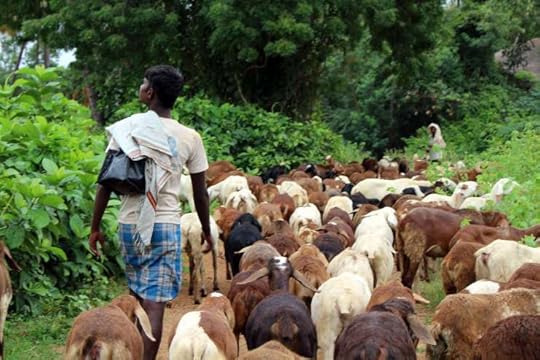Measles, tuberculosis, and wheat

Humans have made many dietary mistakes over the years but two mistakes, in particular, stand out: close contact with animals, mostly ruminants, who conveyed their diseases to us and the adoption of the seeds of grasses as human food. These two practices not only changed the course of human history but also human disease.
Over the last several centuries, Westerners have populated North America, South America, Pacific islands and other regions. Equipped with superior tools of warfare such as swords and muskets, contact with Westerners decimated indigenous people such as the millions of native Americans, Aztecs, and Amazonian rainforest dwellers. Spanish conquistador Hernan Cortes’ conquest of the Aztecs alone is estimated to have reduced the population of 30 million by 90%.
But much of the mortality suffered by indigenous peoples were not from raids, swords, or bullets, but from disease. Westerners brought diseases that indigenous people had not been exposed to, such as measles, tuberculosis, whooping cough, chicken pox, and the flu. These health conditions were common among Westerners, thereby generating partial tolerance or resistance to their effects.
Westerners acquired these diseases through the domestication of animals. When humans first invited grazing creatures–-cows, sheep, goats–-into our huts, adobe homes, or caves, often sleeping in the same room, using them for milk or food, we acquired many of their diseases: tuberculosis, smallpox, flu and a long list of other infectious diseases. These diseases were unknown in humans prior to domestication of grazing ruminants.
The practice of animal domestication therefore changed the course of human civilization, providing a source of calories from animal meat and organs to replace those obtained through hunting, while adding products made from the milk from their mammary glands, which led to the practices of fermentation and cheesemaking, as well as putting animals to work as beasts of burden. In parallel, we acquired a long list of zoonoses from the same animals.
Populations that did not practice ruminant domestication, such as the Yanomami of the Brazilian rainforest or native Americans of the southwest, had not domesticated animals and thereby never encountered such diseases and developed no individual or population resistance or tolerance to the effects. As a result, such diseases proved devastating upon exposure. A disease as pedestrian to Westerners as measles proved fatal to many indigenous people, sometimes wiping out entire villages within months after initial exposure.
Roughly coinciding with the practice of animal domestication was the adoption of the seeds of grasses, “grains”—einkorn wheat in the Middle East, millet in sub-Saharan Africa, maize in central and southwestern America—as food, something that humans had not done for the preceding 3.5 million years of life on this planet. With consumption of the seeds of grasses came an explosion in tooth decay, a doubling of knee arthritis, a marked increase in iron deficiency anemia, among other effects. And, just as populations unexposed to zoonoses arising from animal domestication were decimated by exposure, so it went also with populations that did not have any exposure to the seeds of grasses as food: explosive weight gain, type 2 diabetes, autoimmune diseases, psychiatric illnesses, heart disease, and other conditions. Once again, Westerners developed partial (never total) tolerance to the effects of the seeds of grasses, such as an increase in genes for amylase to deal with the high blood sugars of amylopectin A consumption, or the gene for hemochromatosis to compensate for reduced iron absorption from grain phytates that bind minerals and prevent absorption. But populations that never adopted grains into their diet have no such compensatory advantages, instead developing diseases at far greater rates than Westerners as illustrated by populations such as the Pima Indians of Arizona in which 70% of adults have type 2 diabetes, or native Samoans over 60% of whom are obese.
We can learn a great deal by backtracking over the course of human health over the last several hundred generations. Once you do so, so many of the causes of human disease are revealed. Understand these anthropological and sociological issues and you are provided important insights into the human dietary and health experience. We can eat the organs and flesh of grazing ruminants as replacements for wild game, but we should not sleep in the same rooms as they do. Likewise, the adoption of the seeds of grasses as food was an enormous dietary error, but one that you can easily remedy.
The post Measles, tuberculosis, and wheat appeared first on Dr. William Davis.
Dr. Davis Infinite Health Blog
Recognize that this i The insights and strategies you can learn about in Dr. Davis' Infinite Health Blog are those that you can put to work to regain magnificent health, slenderness, and youthfulness.
Recognize that this is NOT what your doctor or the healthcare system provides, as they are mostly interested in dispensing pharmaceuticals and procedures to generate revenues. The healthcare INDUSTRY is not concerned with health--you must therefore take the reins yourself.
Dr. Davis focuses on:
--Real, powerful nutritional strategies
--Addresing nutrient deficiencies unique to modern lifestyles
--Deep insights into rebuilding the microbiome disrupted by so many modern factors
Follow Dr. Davis here and on social media and you can witness the extraordinary successes people enjoy on his programs. ...more
- William Davis's profile
- 159 followers



